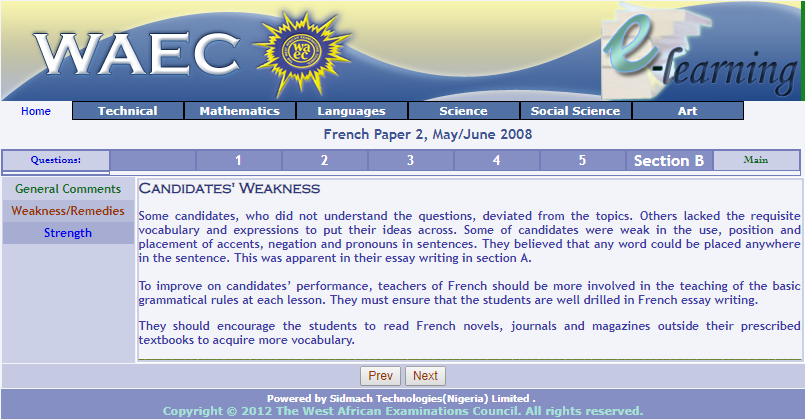Nevertheless, among different worrisome developments which the industry is encountering in the united states in these times, the incidence of examination malpractices in the Nigerian academic process is a cardinal one that is rapidly accepting a degree of national and global distress and harmful dimension. It is a damaging epidemic, which or even relieved soon, may destroy the nation’s all-important education sector.
Examination malpractices are often referred to as wrongdoings before, throughout or after examinations. And, without mincing phrases, they’re having showing, bad effects on the nation’s quality of training, only as numerous college leavers and graduates cannot protect their certificates. As menacing as this endemic development might look, urgent steps must be followed for the cankerworm not to destroy the nation’s potential absolutely before extended: it’s too important to be neglected. And, this is certainly 2020/2021 WAEC Expo, still another cogent reason Nigeria needs ethical renaissance and price regeneration in all aspects of its national life.
So how exactly does one identify what an examination malpractice is? According to Nwana (2000), examination malpractice is defined as the “significant and unprecedented abuse of rules and rules regarding internal and public examinations, beginning from the placing of such examinations through the using of the examinations, their tagging and grading, to the release of the outcomes and the issuance of certificates.”
In the same vein, an academic has attempted yet another information with this unbridled phenomenon as “the behave of omission or commission supposed to produce a scholar pass examination without counting absolutely on his/her independent power or resources.” Specific study studies, conclusions, instructive and knowledgeable submissions of educationalists, academics, and different top stakeholders in this particular segment of the nation’s economy, but, have indicated that there have been one form of examination malpractice or the other before because in the early 1970s when “mass cheating was perpetrated in WAEC” (West African-american Examinations Council).
Perhaps, this realisation jolted the examination body at the secondary school stage to examine severely, numerous manifestations and degree with this retrogressive inclination. It allegedly, categorised the different types of examination malpractice as including getting in foreign components to exam halls, abnormal actions inside and outside examination halls, collusion, impersonation, leakage, bulk cheating and insult/assault on supervisors throughout exams.
Other styles of examination malpractices discovered by WAEC contain help of candidates by invigilators to answer or have idea to hard concepts, while some invigilators also visit the degree of answering some elements of the problem for candidates, regardless of other styles as “giraffing, contraband, bullet, tremendous printing, escort, missiles, and pregnant biros.”
Nevertheless, what has occurred to the emergency of the country’s education process from that point until this very day? Unfortunately, in the extended 21st Century, examination malpractices of varying forms, forms and manifestations, incontrovertibly, have worsened and become a national problem. The unbecoming inclination voraciously, continues to eat strong into the cultural fabric, from principal colleges to tertiary institutions of understanding throughout the Nigerian Federation. It is no wonder then, that the Nigerian Union of Teachers (NUT), of new, passionately asked the National Construction to declare a state of emergency in the knowledge market to be able to consciously revamp the lost honor of the after booming industry.
While many stakeholders in the segment yet, genuinely believe that the widespread malaise the education industry is not only perpetrated by the students alone, but in addition with the effective connivance of other stakeholders, including educators, security brokers, exam invigilators, printers, supervisors, and such, examination malpractices have equally been explained by some in the know of the pervasiveness of the depressing trend as “traditional and institutionalised multibillion Naira business”, on which some depraved persons, groups and institutions supply fat in the united kingdom at the time of now.
But then, a pertinent question any honest-minded Nigerians must question themselves as of this moment is: How did Nigeria get to the decadent state in their knowledge market? Just as some key stakeholders and authorities severally, have stated heartfelt problems concerning the regular injury frequent examination malpractices are inflicting on the state, several factors have already been advanced with this unpleasant development.
Among other reasons adduced for the astronomical escalation in exam malpractices recently are that in certain cases, “issues aren’t linked to the syllabus”, and consequently, examination malpractices are encouraged. It’s also, been alleged that topic syllabuses are overloaded and burdensome for examination individuals, so they really often times find it difficult to cope. But, are these tenable reasons for debateable individuals and their depraved collaborators to participate in exam irregularities? It’s simply indefensible for prospects to resort to examination irregularities. It’s thought that with established, aware initiatives at succeeding in just about any advantageous endeavour, including examinations, “where there is a will, there is a way.”
